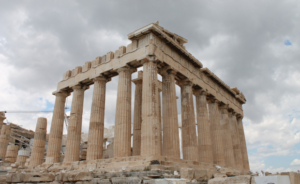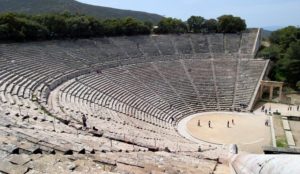A young friend of mine has just returned from a trip spanning several days in Greece.
Butler Cain, a journalism professor at West Texas A&M University (for now) has been good enough to post many of the pictures he took of his journey on his own blog.
Here’s the latest batch:
https://butlercain.com/2016/07/11/acropolis-of-athens/
This group features shots taken at the Acropolis, which looms over Athens as a reminder of the greatness of the civilization it represents. The Greeks aren’t enjoying too much of that greatness these days, as their country struggles its way through a crippling recession.
But the pictures of the Acropolis — and of the Parthenon — remind me of two things.
One is that I’ve been able, along with my wife, to visit that magnificent place more than once. We went there together in 2000 and 2001; I was able to return a third time in 2003.
For those of us of Greek heritage, the sight of those antiquities sends chills throughout our body. I hope to return again.
The second reminder is of something my late father once told me when he was able to visit Athens with my grandfather — who came to the United States from Greece not long after the turn of the 20th century.
Dad told me that when he walked to the top of the Acropolis and was able to sit inside the Parthenon — which I guess you could do back in 1970 when he and my grandfather were there — he could feel his mind expand. He said something like, “I thought of things I never thought I could ponder.”
He felt smarter just being there, inside those columns erected 400-plus years before the birth of Jesus Christ.
Butler Cain is going to move on soon to another academic post in his native “sweet home Alabama.” I wish him well.
Thanks, young man, for sharing these wonderful pictures.
I feel smarter just looking at them.



